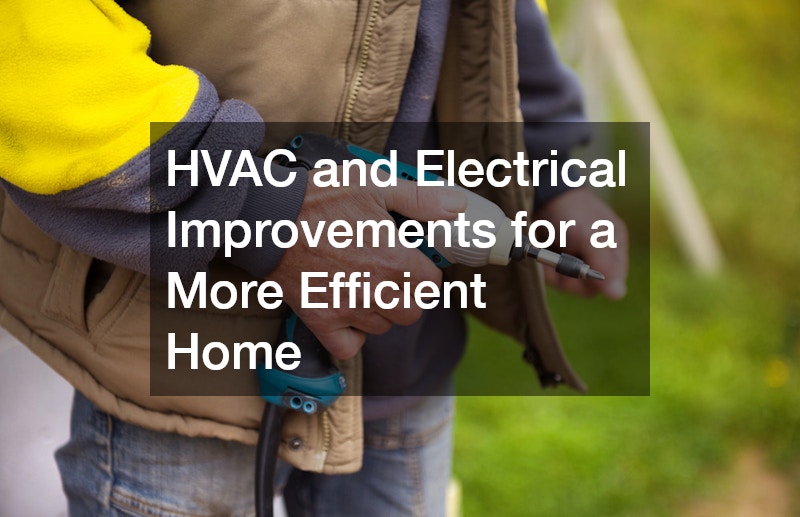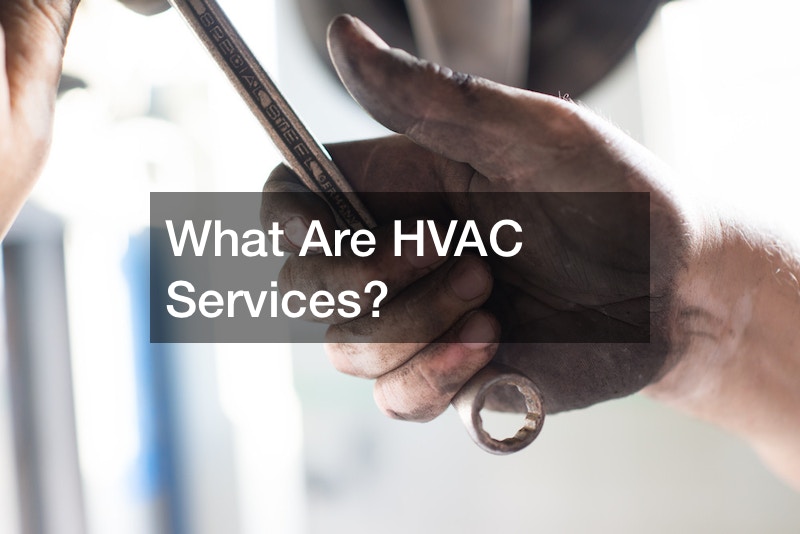Discover how integrating strategic HVAC and electrical improvements can significantly enhance your home’s efficiency. This comprehensive guide covers key topics and queries to ensure an energy-efficient and cost-effective living space.
How do HVAC systems impact home energy efficiency?
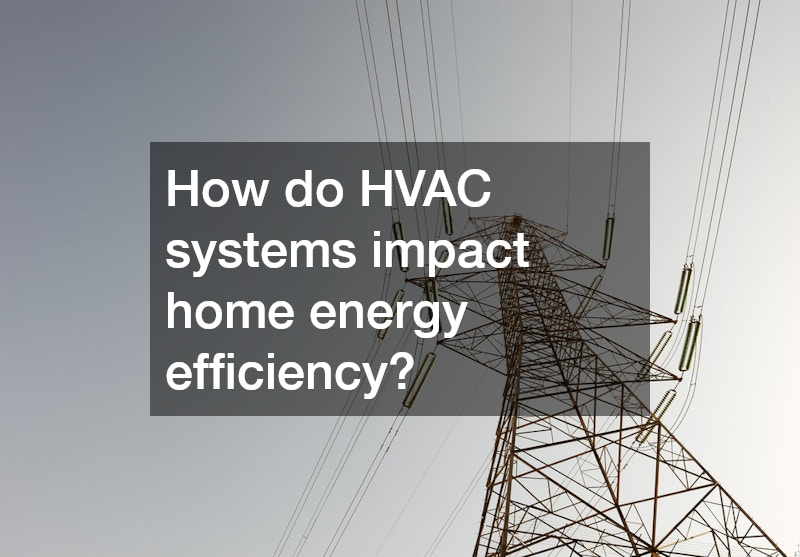
Understanding HVAC Energy Consumption
HVAC systems are among the largest consumers of energy in a household. Heating and cooling processes, especially in older or poorly maintained units, can lead to significant energy waste. By addressing inefficiencies in HVAC operations, homeowners can experience substantial reductions in energy bills and carbon footprint.
Upgrading to Energy-Efficient Units
One of the most impactful steps toward better energy performance is upgrading to modern, energy-efficient HVAC systems. These systems often come with higher SEER (Seasonal Energy Efficiency Ratio) ratings, ensuring optimal performance. A local HVAC company can assess your current system and recommend suitable upgrades that comply with your region’s climate and energy standards.
Regular Maintenance and its Effects
Routine maintenance, including AC repair, filter replacements, and system inspections, ensures HVAC systems operate at peak efficiency. Neglecting maintenance can lead to clogged filters, dirty coils, and overall performance decline. Scheduling professional servicing at least once a year improves airflow, reduces strain on components, and extends the system’s lifespan.
Role of Smart Thermostats
Smart thermostats play a pivotal role in managing HVAC efficiency. These devices allow for temperature adjustments based on time of day, occupancy, or weather forecasts. Integration with home automation systems enables even more refined control, reducing energy consumption without compromising comfort.
Climate Considerations in Efficiency
Your geographical location greatly influences HVAC efficiency. In colder climates, investing in energy-efficient heating systems and proper insulation is essential. In warmer regions, high-efficiency air conditioning units are crucial. Consulting with general contractors or a home builder can help tailor systems to your specific climate zone.
What electrical improvements can increase home efficiency?
LED Lighting and Energy Savings
Switching from incandescent or CFL bulbs to LED lighting is a quick and impactful improvement. LEDs consume significantly less power and last longer, reducing both energy bills and replacement frequency.
Smart Home Technologies
Smart home technologies, part of the broader trend toward home automation, offer centralized control over lighting, HVAC, appliances, and security. These technologies optimize energy usage based on occupancy, schedules, or remote commands, contributing to substantial savings.
Energy-Efficient Appliances
Appliances like refrigerators, dishwashers, and laundry machines account for a significant share of home electricity use. Upgrading to ENERGY STAR-rated models can lead to dramatic energy reductions. These appliances are designed to perform the same tasks while consuming less electricity and water.
Insulation and Electrical Systems
Electrical efficiency isn’t solely about appliances. Proper insulation reduces HVAC load, which decreases electrical demand. It also prevents overuse of heating and cooling systems, enabling a balanced and efficient distribution of power throughout the home.
Power Strips and Energy Monitoring
Advanced power strips and energy monitors can identify and eliminate phantom loads—energy used by electronics in standby mode. Smart strips automatically cut power to devices when not in use, and energy monitors provide detailed insights into household energy consumption.
How can insulation affect HVAC and electrical efficiency?
Types of Insulation
Different insulation materials serve varying purposes. Fiberglass, cellulose, spray foam, and rigid foam boards each have distinct advantages. The right choice depends on the area being insulated and local climate conditions.
Insulation Placement in Homes
Critical areas for insulation include attics, walls, floors, and basements. Properly insulating these zones reduces temperature fluctuations and prevents HVAC systems from overworking. A home builder or experienced general contractor can assess the structure and recommend effective insulation strategies.
Impact on HVAC Load Reduction
Insulation directly reduces the heating and cooling load on your HVAC system. When indoor temperatures remain stable, HVAC systems run less frequently, using less energy and extending their operational life.
Insulation and Electrical Savings
With reduced HVAC operation, electricity consumption drops significantly. Homes with proper insulation also benefit from more consistent temperatures, reducing the need for space heaters, fans, or dehumidifiers that contribute to increased electrical use.
Long-Term Benefits of Proper Insulation
Insulation is a one-time investment with lasting benefits. Besides energy efficiency, it also provides soundproofing, moisture control, and improved indoor air quality. When included in broader home renovations, insulation can increase resale value and comfort.
How do programmable thermostats enhance HVAC efficiency?
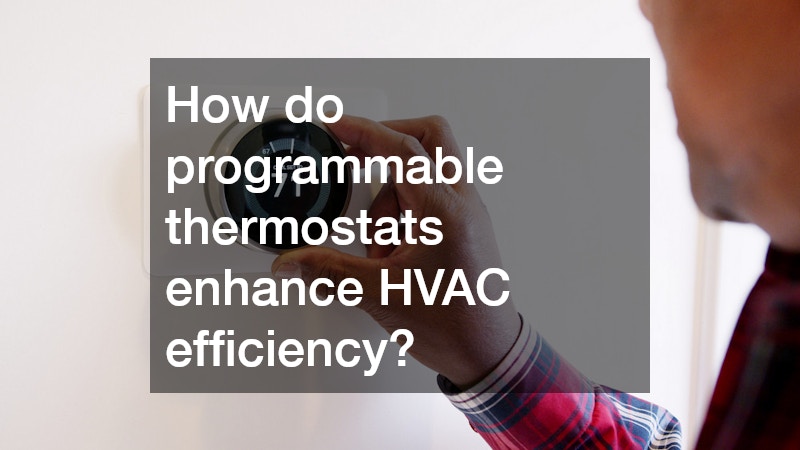
Features of Programmable Thermostats
Programmable thermostats allow users to set schedules that align with their routines. Features may include Wi-Fi connectivity, touch-screen interfaces, learning capabilities, and compatibility with smart home systems. These tools ensure HVAC systems operate only when needed.
Setting Schedules for Energy Savings
Programming your thermostat to reduce heating or cooling during work hours or at night can result in noticeable savings. These schedules help avoid unnecessary energy usage while maintaining comfort when you’re home.
Integration with HVAC Systems
Most modern HVAC systems are compatible with programmable thermostats. Integration allows for better synchronization, especially when used in tandem with zoning systems or home automation platforms, optimizing each room’s temperature based on usage.
Cost-Benefit Analysis of Thermostat Upgrades
While smart thermostats involve an upfront investment, the long-term savings on energy bills often outweigh the costs. Many households report annual savings ranging from 10% to 20% after switching.
Troubleshooting Common Issues
Some common issues include connectivity problems, software glitches, or incompatibility with older HVAC units. Regular updates, proper installation, and professional support from a local HVAC company can resolve most concerns quickly.
What role do ventilation systems play in home efficiency?
Types of Home Ventilation Systems
There are several types of ventilation systems, including exhaust, supply, balanced, and energy recovery ventilators (ERVs). Each serves a different function in managing airflow and maintaining indoor air quality.
Ventilation and Indoor Air Quality
Good ventilation removes pollutants, excess moisture, and odors, promoting healthier indoor air. This is especially important in tightly sealed homes where air exchange is minimal.
Energy Recovery Ventilators (ERVs)
ERVs recover heat or coolness from outgoing air and transfer it to incoming air, reducing the load on HVAC systems. They are highly effective in maintaining energy efficiency while ensuring proper ventilation.
Importance of Balanced Ventilation
Balanced ventilation ensures an equal amount of air is brought in and exhausted out, maintaining pressure stability within the home. This reduces strain on HVAC systems and minimizes energy loss.
Impact on HVAC Efficiency
Efficient ventilation enhances HVAC performance by reducing humidity and improving airflow. Homes with balanced and mechanical ventilation systems experience fewer issues related to mold, mildew, or system overuse.
Are solar panels a viable option for energy efficiency?
Overview of Solar Energy Systems
Solar energy systems convert sunlight into electricity using photovoltaic (PV) panels. These systems reduce reliance on grid power and lower electricity bills.
Installation Considerations
Before installation, factors such as roof orientation, shading, panel type, and local regulations must be considered. General contractors or specialized solar installers can assess these variables to design an effective system.
Cost and Energy Savings Potential
Though the initial investment in solar panels can be high, the long-term savings are substantial. Solar panels can offset a large portion of a home’s electricity needs, especially when paired with efficient HVAC, lighting, and water heater systems.
Integration with Electrical Systems
Solar energy systems can be integrated with existing electrical infrastructure, and in many cases, with battery storage solutions. This allows excess energy to be stored and used during peak hours or outages.
Maintenance of Solar Panels
Solar panels require minimal maintenance—mostly cleaning and periodic inspections. When installed properly, they can function efficiently for 25 years or more.
How do energy audits improve home efficiency?
Conducting an Energy Audit
An energy audit is a detailed assessment of a home’s energy use. It identifies areas of waste, evaluates equipment efficiency, and provides a roadmap for improvements.
Identifying Inefficiencies
Audits often uncover leaky ducts, insufficient insulation, outdated appliances, and HVAC inefficiencies. These insights guide targeted upgrades that yield the best return on investment.
Prioritizing Improvements
Energy audits help prioritize changes based on cost, impact, and ease of implementation. This step-by-step approach allows homeowners to gradually improve efficiency within budget constraints.
Professional vs. DIY Audits
While DIY energy audits can reveal some issues, professional audits use tools like blower doors, infrared cameras, and energy modeling software for comprehensive analysis.
Post-Audit Implementation
Once an energy audit is complete, the next step is implementing the recommended changes. These may include sealing air leaks, upgrading insulation, scheduling HVAC or AC repair, replacing outdated appliances, or installing programmable thermostats. Many of these improvements may involve collaboration with general contractors or a local HVAC company to ensure the work is completed to code and with optimal efficiency in mind. Addressing these areas systematically allows for measurable improvements in energy performance and can lead to noticeable reductions in utility costs within months.
How can I ensure efficient hot water systems?
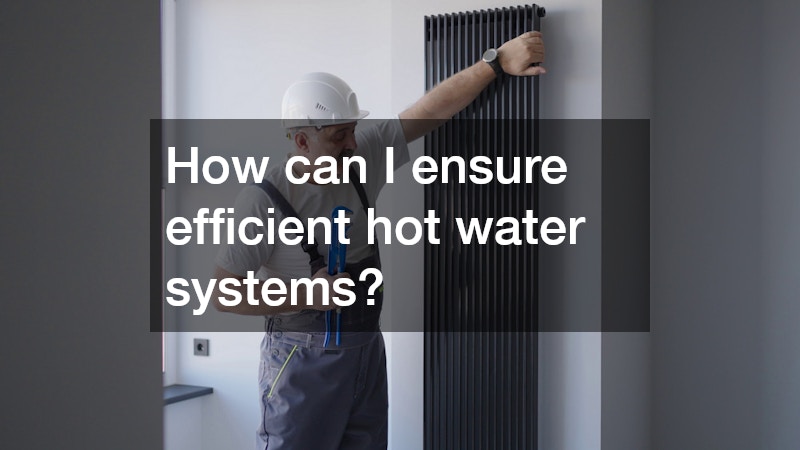
Types of Hot Water Systems
There are several types of hot water systems to consider, each with its own efficiency profile. Traditional tank water heaters are common but often less efficient than tankless systems, which heat water on demand. Solar water heaters and heat pump water heaters are also gaining popularity for their energy-saving capabilities. Choosing the right water heater for your home depends on household size, climate, and available energy sources.
Insulating Hot Water Pipes
One of the simplest and most cost-effective ways to increase the efficiency of your water heating system is by insulating hot water pipes. This reduces heat loss as water travels through the plumbing system, allowing water to arrive at fixtures hotter and faster. It also lessens the strain on your water heater, extending its life and reducing energy usage.
Energy-Efficient Water Heaters
Upgrading to an energy-efficient water heater can significantly cut down on energy costs. Look for models with high EF (Energy Factor) ratings or ENERGY STAR certifications. Consulting with a local plumber or home builder can help you determine which type best suits your home. Additionally, proper placement and venting of the unit, often handled by professionals during home renovations, can further improve efficiency.
Usage Efficiency Tips
Adopting simple behavioral changes can also enhance water heating efficiency. Using low-flow fixtures, washing clothes with cold water, and turning down the water heater thermostat are all easy ways to conserve energy. Incorporating home automation tools to control water heating during off-peak hours can also contribute to savings.
Maintenance for Optimal Performance
Just like HVAC systems, water heaters require regular maintenance. Flushing the tank to remove sediment, checking the anode rod, and scheduling routine inspections with a plumbing repair professional will help maintain peak performance and energy efficiency.
What are the benefits of smart home technology for efficiency?
Overview of Smart Home Systems
Smart home systems encompass a wide array of technologies, including lighting, heating and cooling controls, security systems, and appliance management. These systems form the core of home automation, making it easier to monitor and manage energy use.
Energy Management with Smart Technology
Home automation allows for centralized control over devices, ensuring that lights, heating, and appliances operate only when necessary. Smart power strips and connected appliances can turn off during inactivity, reducing energy drain. When combined with HVAC and water heating systems, the energy-saving potential multiplies.
Security and Efficiency Synergies
Smart home systems offer dual benefits of enhanced security and energy efficiency. For instance, smart locks and motion sensors can deactivate lights and HVAC systems when no one is home, conserving energy. Integration with other features such as surveillance systems or smart smoke detectors also contributes to overall household safety and efficiency.
Cost Implications and Savings
While initial installation costs can be high, the long-term savings often justify the investment. Utility bills are reduced, and many homeowners see a return on investment within a few years. Smart home upgrades also enhance property value, making them a wise choice for those planning home renovations or preparing to sell.
Future Trends in Smart Home Technologies
The future of home automation points to greater integration, AI-driven systems, and increased energy autonomy. Advancements like machine learning algorithms that predict energy use patterns, or homes that integrate solar panels, battery storage, and smart grids, will play a central role in tomorrow’s efficient homes.
Are there government incentives for HVAC and electrical improvements?
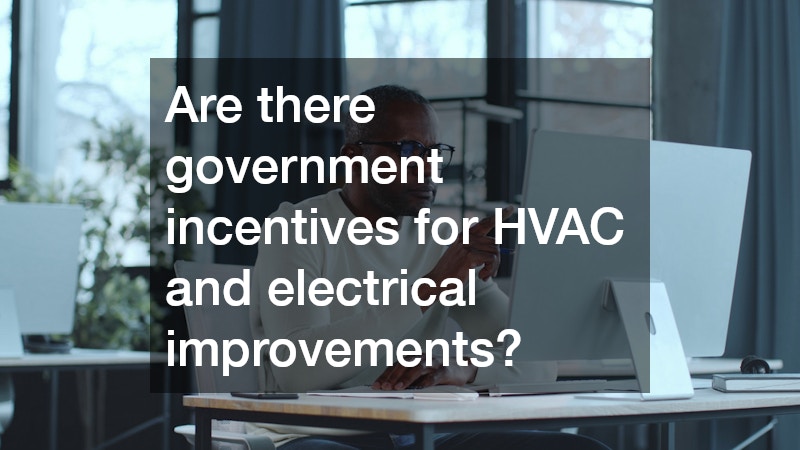
Overview of Available Programs
Many government programs offer incentives for energy-efficient upgrades, including rebates, tax credits, and low-interest financing. These programs often cover HVAC upgrades, solar panel installations, water heater replacements, and insulation improvements. Some utility companies also offer rebates for specific improvements, like smart thermostats or energy audits.
Steps to Apply for Incentives
Applying typically involves submitting documentation of the upgrade, including proof of purchase, installation, and efficiency ratings. Programs vary by state and region, so it’s essential to consult local resources or a knowledgeable general contractor who is familiar with navigating the application process.
Benefits of Utilizing Incentives
Taking advantage of incentives lowers the financial barrier to making energy-efficient improvements. These programs not only help offset initial costs but can also increase the ROI on large-scale renovations. Over time, this support leads to greater adoption of sustainable practices and technologies.
Eligibility Criteria
Eligibility for incentives usually depends on factors like income level, property type, and the efficiency rating of installed equipment. Homeowners should research criteria in advance or work with professionals such as home builders or local HVAC companies who can guide them through qualification and documentation.
Keeping Updated with Policy Changes
Government policies on energy efficiency are constantly evolving. Staying informed through municipal websites, energy councils, or trade organizations can help homeowners make timely decisions. Enlisting help from professionals in the field ensures you won’t miss out on new opportunities or updated regulations.
Integrating HVAC and electrical improvements into your home is a crucial step toward achieving greater energy efficiency, comfort, and long-term cost savings. From upgrading to high-efficiency HVAC systems and water heaters to installing smart thermostats and home automation tools, the path to a more sustainable home is clear. Collaborating with experienced general contractors, local HVAC companies, and home builders ensures that every component, from insulation to ventilation, works cohesively.
Additionally, attention to often-overlooked details—like plumbing repair, pipe insulation, energy audits, and the installation of features like gas fireplaces or efficient house siding—can make a significant impact. Each improvement not only enhances your home’s functionality and value but also contributes to a greener footprint.
As technologies evolve and government incentives expand, now is an excellent time for homeowners to take action. With thoughtful planning and professional support, creating a high-performing, efficient home is not only possible—it’s more accessible than ever.
